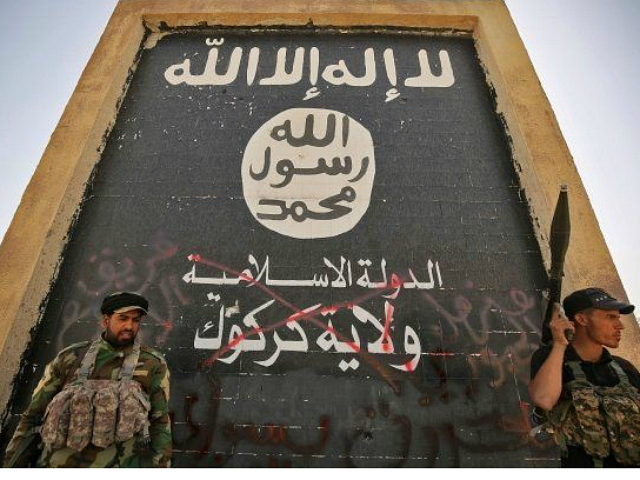U.S.-supported Iraqi government troops and Iran-allied Shiite militiamen have reportedly retaken the “last” Islamic State (ISIS/ISIL) bastion in northern Iraq, marking the latest sign that the jihadist group’s so-called caliphate in the region is dwindling.
In cooperation with U.S. troops, Iraqi government forces and Iran-backed Shiite Popular Mobilization Units/Forces (PMU/PMF) captured the northern Iraqi town of Hawija and the surrounding territory in the disputed province of Kirkuk, claimed by both Shiite-led Baghdad and the mainly Sunni Kurdistan Regional Government (KRG).
“With the fall of Hawija, which lies near the Kurdish-held oil city of Kirkuk, the only area that remains under control of Islamic State in Iraq is a stretch alongside the western border with Syria, where the militant group is also in retreat,” reports Reuters.
The U.S.-backed offensive to dislodge ISIS from the Hawija area, where the United Nations believes up to 78,000 people could be trapped, began on September 21.
Reuters quotes a statement on the battle in and around Hawija issued by the joint operations commander in Iraq, Lt. Gen. Abdul Ameer Rasheed Yarallah, saying, “The army’s 9th armored division, the Federal Police, the Emergency Response division and … Popular Mobilization liberated Hawija.”
Although the Institute for the Study of War and other analysts have linked Iran-backed Shiite militiamen to U.S. military casualties in Iraq, the PMU, also known as and Hashd al-Shaabi, has participated in U.S.-supported operations against ISIS in the region.
The U.S. military has praised the PMU’s contributions to the fight against ISIS.
ISIS still controls the northern Iraqi border town of al-Qaim near Syria and the region surrounding it.
Nevertheless, Reuters declares:
Islamic State’s cross-border “caliphate” [in Iraq and Syria] effectively collapsed in July, when U.S.-backed Iraqi forces captured Mosul, the group’s de facto capital in Iraq, in a grueling battle which lasted nine months.
The militants’ leader, Abu Bakr al-Baghdadi, who declared the caliphate from Mosul in mid-2014, released an audio recording last week that indicated he was alive, after several reports he had been killed.
He urged his followers to keep up the fight despite setbacks.
ISIS losses have “dramatically accelerated” since American President Donald Trump took office early this year, according to a high-ranking U.S. Department of State (DOS) official.
In August, Breitbart News learned from Brett McGurk, the DOS special envoy to the U.S.-led anti-ISIS coalition, that the alliance had seized nearly 80 percent of the territory ISIS is believed to have controlled at the pinnacle of its reign of terror in Iraq and Syria in early 2015.
Conversely, ISIS still controls up to 8,000 square miles or more than 20 percent of its so-called caliphate.
Clearing ISIS out of northern Iraq has pushed the group towards the Iraqi border with Syria, where it faces opposition from troops loyal to Iran and Russian-backed dictator Bashar al-Assad as well as U.S.-allied Kurds who control the northern part of the country.
Reuters acknowledges that the fight in Hawija has brought the Iraqi forces face to face with their Kurdish Peshmerga counterparts in Kirkuk.
Baghdad, Iran, Turkey, and Syria oppose the independence referendum held by the autonomous Iraqi Kurdistan region last Monday, citing concern that it will fuel separatism among its Kurdish population.
Although the Iraqi government has already imposed referendum-linked sanctions, PM Abadi conceded that he could understand the Kurds’ “aspirations.”
Reuters reports, “The Kurds are the region’s fourth-largest ethnic group, spread across Iran, Turkey, Syria, and Iraq, all of which oppose any moves towards a Kurdish state.”
The KRG, which has long expressed its desire to break away from Baghdad as an independent state, has remained steadfast in its commitment to become a sovereign nation.
Since Kurds overwhelmingly voted “yes” to independence, Baghdad, Tehran, and Ankara have threatened coordinated military retaliation if the KRG does not cancel the outcome of the referendum.
KRG officials have refused to let go of their independence wishes despite a low level of support from the international community, including the United States, which came out against the vote.
The PMU cautioned that it is willing to march on Kirkuk in response to the referendum.
Tensions between the PMU and Kurdish Peshmerga fighters in the disputed territory of northern Iraq had been brewing for months before the independence vote last Monday.
The vast majority of Kurds identify themselves as Sunni, but there are some Shiites in the Kurdistan region that covers areas of Iraq, Iran, Turkey, and Syria.
While the PMU is predominantly Shiite, the force includes a few Sunnis, Kurds, Yazidis, and even Christians, among other minorities in Iraq.

COMMENTS
Please let us know if you're having issues with commenting.